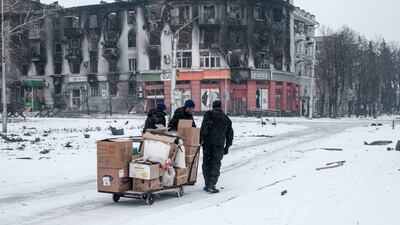UK Prime Minister Rishi Sunak has called for a Nato charter to guarantee support for Ukraine, telling an international conference that Britain would be a supplier of long-range missiles to aid a counter-offensive by Kyiv.
"We need to do more to bolster Ukraine’s long-term security," he said at the Munich Security Conference in Germany.
"We must give them the advanced Nato-standard capabilities that they need for the future.
"And we must demonstrate that we’ll remain by their side, willing and able to help them defend their country again and again."
The Prime Minister said he hoped the coming Nato summit in Vilnius would build long-term assurances. "Our aim should be to forge a new charter in Vilnius to help protect Ukraine from future Russian aggression," he said.
Mr Sunak said Ukraine's forces had reached an inflection point in the battle against Russian troops and called on fellow leaders at the summit to “double down” on military support for President Volodymyr Zelenskyy.
It was important to ensure a "decisive advantage on the battlefield", he said.
"That would be my pitch to everyone - do what we are doing, join the countries that are providing that support, intensifying and accelerating it now," he said. "I think the alternative is far worse.
"We are all united in wanting Ukraine to win and if there's an opportunity to do that sooner, and take advantage of the moment that we have, why would we not seize it? What are we waiting for?"
The idea of a new charter or framework to sustain and build the alliance with Ukraine was welcomed by Jens Stoltenberg, Nato’s secretary general, in his remarks to the Munich Security conference on Saturday. He said President Vladimir Putin was preparing Russia for a long war by building up his military to sustain the fighting.
“There are no indications he has changed his ambitions,” Mr Stoltenberg was expected to tell the Munich conference later Saturday, according to a text of his remarks.
“He is mobilising hundreds of thousands of troops, increasingly putting the Russian economy on a war footing and reaching out to other authoritarian regimes, such as Iran and North Korea, to get more weapons.”

In her panel the EU president Ursula von der Leyen suggested delivery of the Covid vaccine could serve as a model for how to rapidly expand armaments production to boost Ukraine's arsenal and those of its donor countries.
“We could think of, for example, advanced purchase agreements that give the defence industry the possibility to invest in production lines now to be faster and to increase the amount they can deliver,” she said.
Officials warn Ukraine is currently using ammunition faster than Western countries are able to produce and supply it.
“It is now the time to speed up the production and to scale up the production of standardised products [like ammunition] that Ukraine needs desperately,” she said.
In an apparent attempt to encourage others to offer long-term training to Kyiv’s armed forces, Mr Sunak added Ukrainians were fighting for the security of all nations.
“What is at stake in this war is even greater than the security and sovereignty of one nation. It’s about the security and sovereignty of every nation," he added. “Because Russia’s invasion, its abhorrent war crimes and irresponsible nuclear rhetoric are symptomatic of a broader threat to everything we believe in.
“When Putin started this war, he gambled that our resolve would falter. Even now he is betting we will lose our nerve. But we proved him wrong then, and we will prove him wrong now.”
Beyond Nato considerations, Mr Sunak argued that securing a lasting peace for Ukraine would also require international law to be strengthened.
With the first anniversary of the conflict approaching, he will also press for a new plan to protect Ukraine’s sovereignty in the future.
The intervention follows Mr Zelenskyy’s visit to Britain, Paris and Brussels last week, when he made the case for fighter planes.
Mr Sunak used Mr Zelenskyy’s visit to announce a two-pronged approach to support for Ukraine, offering military kit immediately to fend off a Russian offensive and preparing its forces for the longer term, but not the requested planes.
To coincide with the war leader’s momentous trip, the UK government announced that Britain would extend its training mission — under which 10,000 Ukrainian troops have already come to the UK — to cover fighter jet pilots, ensuring Ukraine can defend its skies using “Nato tactics” in the future.
The training of pilots is expected to commence in the spring, according to Downing Street officials.


































